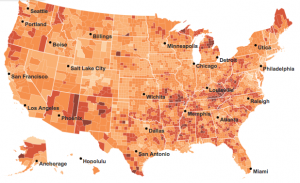 We all have this image of those that depend on government assistance, stereotyped by the so-called welfare queen, who is trying to milk the system as much as possible; someone who epitomizes laziness and wants someone else to care for them.
We all have this image of those that depend on government assistance, stereotyped by the so-called welfare queen, who is trying to milk the system as much as possible; someone who epitomizes laziness and wants someone else to care for them.
However, a recent NY Times piece points out that all of us are depending more and more on government assistance to get by and, ironically, it is in precisely those places where opposition to government aid is greatest where dependence on that aid has grown the most. In particular, the article describes research by a professor at Dartmouth College, Dean Lacy, who has found:
Support for Republican candidates, who generally promise to cut government spending, has increased since 1980 in states where the federal government spends more than it collects. The greater the dependence, the greater the support for Republican candidates.
Conversely, states that pay more in taxes than they receive in benefits tend to support Democratic candidates.
That is, the places that give more than they get tend to be Democrat, and those that get more than they give tend to be Republican. This isn’t new, it has been discussed before. It always struck me as strange. Those that rail most against taxes and big government are those that receive the most benefit. Whether this is from farm subsidies, food stamps, or whatever, the fact that the objections to government helping people come most from those getting that help strikes me as odd.
The article doesn’t give much insight into why this is the case. It does allude to the fact that maybe some of those receiving benefits are somehow ashamed of that and would rather that it not be so easy to get government assistance. That is, they’d almost rather be forced to take a harder road where they are more self-reliant. That the government helps them is almost a failing on their part, which by extension is a failing of the government.
I guess I don’t quite understand fully. Maybe it is related to the so-called American dream which provides us with the comforting notion that if we just work hard enough, we will have that nice suburban house with the white picket fence and the 2.3 children in an idyllic neighborhood. The reality, in my opinion, is not so clean. There is no way our system can support all of us attaining that ideal; as I’ve written about before, it seems to me that a large number of us have to fail in achieving that dream in order for our system to function. We need people at the bottom of the ladder to perform those jobs that the majority of us don’t want to do.
So, is it a failure to attain that dream, a failure of being self-sufficient and thus needing government help the reason for this contradiction in people taking government resources but at the same time wanting to cut them? Do they feel guilty for having to take them? Do they resent having to, in some sense, rely upon those that are willing to pay more taxes to support them? Do they resent that they even have the option, that government isn’t forcing them to struggle heroically in face of adversity, in the fashion that so much of American mythology is based?
I guess, in the end, I don’t have an explanation and I really don’t understand this dichotomy. If we do end up electing politicians who do cut the safety net, it is those very people who want it cut that will be hurt the most. Ironically, it is those that support having the safety net that can best deal with it being cut. Not much of politics seems rational to me, and this particular issue epitomizes, for me, the irrationality of politics in America.